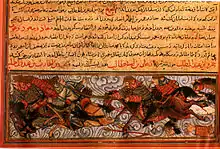
The Battle of Badr was a key battle in the early days of Islam and a turning point in Muhammad's war against his Quraish opponents in Mecca. The battle has been passed down in Islamic history as a decisive victory ascribed to either divine intervention or the genius of Muhammad. Although it is one of the few battles mentioned by name in the Muslim holy book, the Qur'an, virtually all contemporary knowledge of the battle at Badr comes from traditional Islamic accounts, both hadiths and biographies of Muhammad, written down decades after the battle. Prior to the battle, the Muslims and Meccans had fought several smaller skirmishes in late 623 and early 624, as the Muslim ghazawāt plundering raids grew increasingly commonplace, but this was their first large-scale battle. Muhammad was leading a raiding party against a caravan when he was surprised by a much larger Quraishi army. Advancing to a strong defensive position, Muhammad's well-disciplined men managed to shatter the Meccan lines, killing several important leaders including Muhammad's chief opponent, Amr ibn Hishām. For the early Muslims, the battle was extremely significant because it was the first sign that they might eventually overcome their enemies in Mecca, one of the richest and most powerful pagan cities in pre-Islamic Arabia.